My year in review post spawned an interesting amount of personal correspondence, and a couple of people have asked me (both due to my Disclaimer and my rare mentions of work) two distinct, but closely related questions:
- If I would/could consider blogging (openly, without reservation) about my work and what I do at my company if they asked me to.
- If I would ever accept that a company included a “gag order” in my contract (as apparently some companies are doing) preventing me from discussing any technical or business issues online.
As it happens, my answer would be yes to both - guardedly, but undoubtedly. Let’s go through these in turn, shall we?
The Background Static
First off, let’s try to understand what the water is like before dipping in.
According to Technorati’s state of the Blogosphere for 2008 (which, like any kind of statistics, should be taken with a pinch of salt), corporate and/or professional blogs are becoming widely popular, not just in absolute terms but also in terms of reach.
And although the outlook seems mostly positive, when you start trying to correlate data to figure out if it actually makes sense to have corporate blogs, things start to get muddled.
I think this chart (taken from here) shows it best:
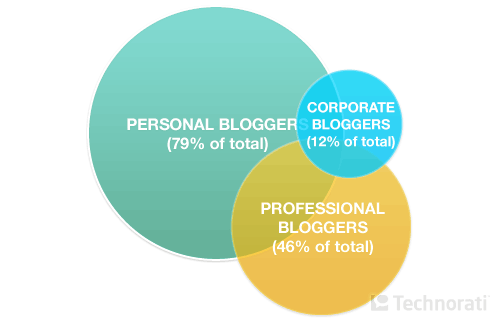
There is quite a bit of overlap, and that’s really no surprise. There are plenty of “blogs” that straddle the personal and business domains1. And, as we all know, the distinction between content and advertising is blurring fast.
For instance, this very nice table (taken from here) makes it plain that brands do gain a degree of exposure from blogs:
| Do you talk about products or brands on your blog? | Frequently | Never | Occasionally |
|---|---|---|---|
| I blog about company information or gossip that I hear about | 21% | 37% | 32% |
| I blog about some of my every-day experiences in stores or with customer care | 34% | 21% | 45% |
| I post about brands that I love (or hate) | 41% | 11% | 48% |
| I post product or brand reviews | 37% | 18% | 45% |
What I don’t agree with, however, is that the intersection between that exposure and blog credibility is necessarily worth the risk for a corporation.
The pundits and blogosphere nuts in the audience will at this point start piping that the perception of authority regarding blogs seems to be increasingly positive…
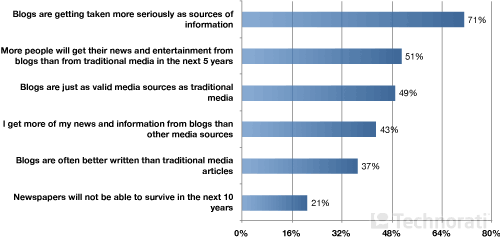
…which makes for a very pretty chart until you take a step back and remember that this is Technorati’s take, based on a panel of… bloggers.
So there is a significant echo chamber effect here, and the chart above tells us more about bloggers’ navel-gazing than true authority2.
Going Pro
First off, allow me to state that I still stand by what I wrote three years ago - i.e., that blogging does not necessarily have a positive effect on your career. More to the point, I think that the following chart (taken from here) is mostly bunk:
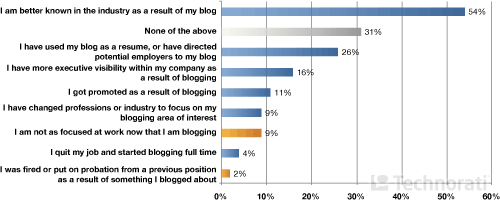
…and that it, too, is a result of the “echo chamber” effect of surveying bloggers about blogs.
Still, I have no doubt whatsoever that I could take up doing a corporate blog. In fact, there is considerable openness inside Vodafone to the notion of internal blogs - there’s even a pretty active Wiki, and the company intranet continues to grow by leaps and bounds3, which was fun to have seen grow from nothing to a pretty active culture.
And I have, once or twice, wondered about starting an internal blog. The thing is that not only do some of the things I wrote back in 2005 still apply, but I simply have no spare time. Referring to the Technorati figures one last time, consider these two charts, which reflect an insane amount of time spent writing and a breakneck pace in posting:
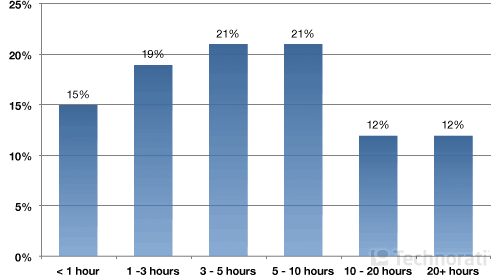
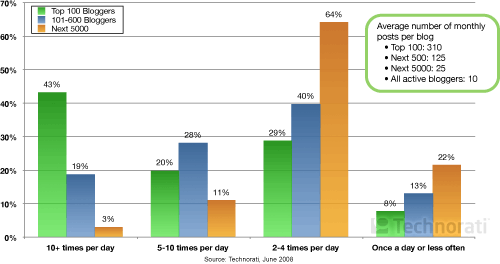
Me, I’m lucky if I have half an hour a day to use a computer at home4, let alone spend this much time pouring my intellectual guts out on the Internet (or an Intranet, or anywhere else by that matter).
Good writing takes time, and the kind of writing I prefer (short, concise, focused) takes at least twice as much. Pascal (not Mark Twain, like a lot of people think) said it best:
“I have made this letter longer than usual, only because I have not had time to make it shorter.”
And I, at least, don’t think that there are many well-written blogs out there - regardless of editorial/personal style, the quality of writing on the Internet at large isn’t that hot, and even though there is no direct, mathematically correct way to correlate the graphs above without the source data, it’s plain that the output of all those hours folk spend on their blogs is biased towards quantity rather than quality.
But going back to where it regards my taking up an “official” assignment, there’s another (somewhat related) barrier, which is that writing quality prose is seldom a valued activity outside the media industry - and judging by the declining standards of most publications, maybe not even there.
So there would have to be a number of adjustments (both cultural and in terms of subject matter). Not to mention that I prefer to write as a way to relax, and writing even the least bit of a blog post at the office feels completely wrong to me. For now, at least, the cons clearly outweigh the pros.
Still, it’s something I can see myself doing if everything fell into place. Beats me if it will ever happen, but provided I could avoid turning into a PR mouthpiece (hard, given that I sometimes do PR myself), it would probably be fun.
But, on my private time, I prefer to err on the side of caution.
The Brick Wall
As to removing my web presence altogether if the company required it, the answer would also be yes. A clear, resounding “yes, of course.”
Even if it pains some people to read this, if I ever went to work for, say, “Apple”:Apple or another company that made it a requirement to do so (like some management consultancies), I would vanish from the face of the Internet as best as I could - which is tough, considering the wayback machine and whatnot, but entirely feasible.
And yeah, that includes time sinks like “Facebook”:com/facebook (which I practically don’t maintain) or Twitter (which I tolerate only because most of my friends seem to be on it these days), and any other form of social networking. I would most likely freeze everything except LinkedIn (which is a better and less intrusive way of keeping track of colleagues), and wipe all the content there if whoever wanted to employ me asked me to5.
As much as I love writing in general, the challenge of working at one of those places would far outweigh the loss of one creative outlet (and I suppose I could devote more time to other hobbies like outdoor photography or music).
There are no absolutes in either scenario. There would be no loss of individuality either way, too, given that I’m rather a bit more than a bunch of prose rendered as HTML, and don’t intend to have my whole life hinging on whether or not my writing is out there for everyone to see.
The bottom line is that the present, like they say, is merely a convenient arrangement for everyone concerned.
So enjoy it while it lasts.
-
I have (many) gripes with the Technorati numbers and methodology, since the numbers belie inputs from bloggers that would otherwise be considered news site owners rather than individuals… ↩︎
-
I personally can’t wait until the local Portuguese blogosphere pundits start rolling out their personal take on this and make fools of themselves for yet another year, but that’s beside the point now. ↩︎
-
This, by the way, is public information. ↩︎
-
I honestly have no idea of where people find enough time to blog. This post was started on December 29th, late in the evening, and has been written in 15-minute slices for nearly a week, in between holidays, errands and family life. ↩︎
-
I would, of course, expect them to be nice and up front about it. ↩︎